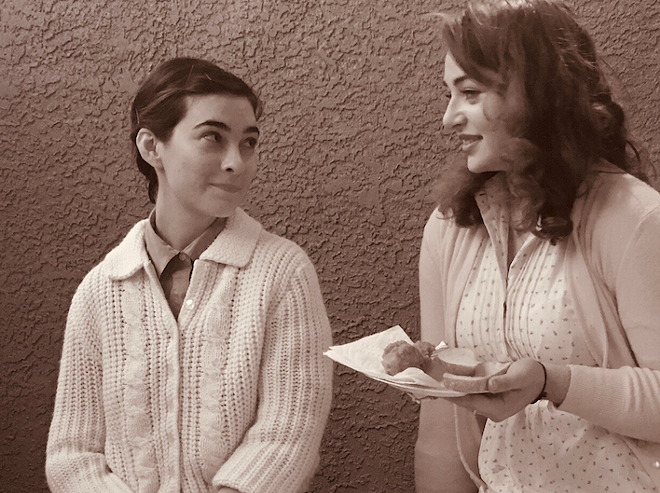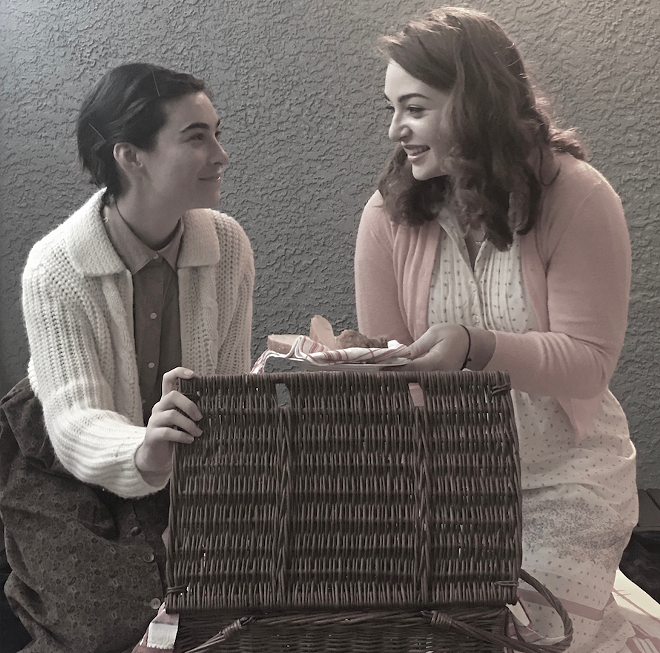When a theater company sells tissue in the lobby, you sort of know what to expect. Innovocative Theatre’s A Shayna Maidel promised plenty of tears and, well, if I didn’t cry many, I shed more than a couple. The burgeoning company’s winter production shows us how two lives diverged and joined together again, but mostly, it shows us how the murder of Jews during the Holocaust shredded families and community. This is the story of two sisters, a family, a community.
IF YOU GO
A Shayna Maidel
Through Jan. 18 (Jan. 19 sold out): Fri.-Sat., 8 p.m.; Sat., 3 p.m.
$25-30
Innovocative Theatre at Stagweworks, 1120 E. Kennedy, Ste. 151, Tampa.
813-374-2416; innovocativetheatre.org
Meet Rose (Kristina Kourkoulos), the younger of two sisters, who definitely had it better than her sister. As a small child, she and her father left Poland for America. Her older sister Lusia (Kayla Witoshynsky) had scarlet fever and couldn’t make the trip; the intention was that she and her mother (played in a series of cleverly established flashbacks by Michele McCarty) would later follow. As a depression gripped not only the United States but the world, their father, Mordecai (Larry Corwin) couldn’t send for his wife and daughter, leaving them exposed to German soldiers.
We enter their lives as Lusia finds her family in America, coming to live with Rose. In our collective exposure to the Holocaust we think often of ghettos and work camps and mass murder, and, at times, the liberation that followed.
What we need to think about, too, A Shayna Maidel tells us, is what came after the liberation. We watch as Rose insists her husband Duvid (Thomas Brown) has survived, although she has no way to know and — more disturbingly to our digitally connected sensibilities — no effective way of searching for him. We learn of Duvid through flashbacks, not knowing his fate until the play’s final moments.
Flashbacks, too, is how playwright Barbara Lebow chooses to show us Lusia’s past: her best friend Hanna (a delightful performance by Sunshine Hughes), her family life, her post-liberation actions. While both Kourkoulos and Witoshynsky turn in respectable performances, we fall in love with Lusia during these flashbacks. I wish we could have seen more of Mama, more of Rose, more of Mordecai and Duvid during this play, because what we see of Lusia is what makes us weep for what she lost and who she was.
Hughes’ Hanna, too, pulls back the curtain to show the pains of the past and loss. Her performance walks an emotional tightrope between the innocence of near-teen girls giggling over a boy and the all-too-soon adulthood of a Holocaust survivor. It is not director Staci Sabarsky’s fault she didn’t get more stage time (blame the playwright) but nevertheless I wanted more of Hanna.
The throughline for this play, we think at first, will be Rose, but Kourkoulos plays her as a somewhat sheltered American girl who at first seems to resent her sister’s re-appearance. it heartened to me to see her warm to her sister as the show progressed, and although I enjoyed her performance, both their characters could benefit from better energy together onstage.
Some aspects of this production shine — Hughes’s Hanna, William Glenn’s lighting design, Jeannine Borzello’s sets — and others fall closer to a sturdy, respectable “good.” Some things I found too stereotypical: Lusia’s accent (which she didn’t have during the flashback scenes), her costume, Mordecai’s almost-caricature of a Jewish father; others, I longed to have more of, like the energy between Mama and Lusia, or between Hanna and Lusia. By the end of the show, audiences could finally feel a relationship developing between Lusia and Rose, and let me tell you, that comes as a welcome relief.
But then, that’s sort of the point of the play, isn’t it? That two sisters reunited, or what’s left of a whole family, reunited, cannot simply pick up where they left off before the horrors of genocide ripped their lives apart. A Shayna Maidel doesn’t simply tell us a story, as the play’s name suggests, of a pretty girl, or even two; it takes us well below the surface of those pretty girls and makes us feel the isolation, the horror, and the sadness. By the play’s end, it shows us a reunion of spirit, although much work remains.
And that ending? That’s perhaps the greatest reason of all you’re going to need those tissues. I know I did.
Cathy Salustri is the former arts + entertainment editor of Creative Loafing. Contact her here.
Follow @cl_music on Twitter to get the most up-to-date music news, concert announcements, and local tunes. Subscribe to our newsletter, and listen to us on WMNF 88.5-FM’s “Radio Reverb” program every Saturday from 4 p.m.-6 p.m.



